Politics
Meet Arizona’s most powerful political couple, who are on opposite ends of an abortion ban
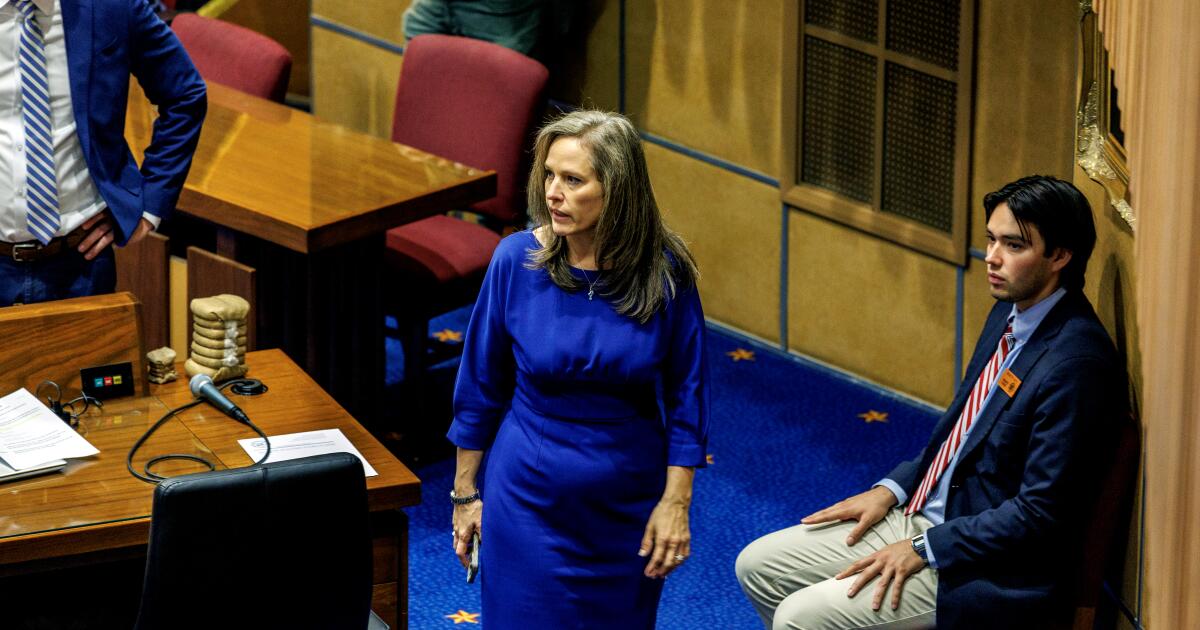
Before she voted to repeal Arizona’s near-total abortion ban, state Sen. Shawnna Bolick rose from her seat on the Senate floor to painstakingly detail one woman’s three difficult pregnancies.
The first pregnancy was not viable and would require a dilatation and curettage, known as D&C — which, as the doctor informed the patient, is “like having an abortion” because tissue is removed from the uterus.
The second pregnancy resulted in a healthy baby boy, but required an emergency C-section. The third delivered a baby girl, but demanded 23 weeks of bed rest.
Then Bolick revealed the story’s twist.
“I know the chronicles of these pregnancies quite intimately because they’re all my own,” she said. “None of my pregnancies were easy, and none of them would have been possible without the moral support of my husband.”
And yet the Republican state senator omitted a crucial detail about her husband: that he was part of the reason she had to cast the controversial vote. Arizona Supreme Court Justice Clint Bolick was part of the court’s four-seat majority that allowed enforcement of an 1864 law prohibiting abortions except when a woman’s life is at risk.
“Justice Bolick made a legal construction decision. That’s what judges do,” said Cathi Herrod, president of the Center for Arizona Policy and a staunch opponent of abortion. “Sen. Bolick made a policy decision. That’s what state senators do. They both were carrying out the duty of the position that they hold.”
In an op-ed Tuesday in the Arizona Republic, Clint Bolick said his marriage could easily withstand his wife’s vote: “That caused no marital disharmony because she is a policymaker and I am not.”
By coincidence, Justice Bolick faces a retention vote in November, just as Sen. Bolick is up for election. Both have already felt political backlash over the 1864 law. Will Arizona’s most powerful couple in government also pay a price at the ballot box — one for permitting the abortion ban, the other for ending it?
Arizona Supreme Court Justice Clint Bolick administers the oath of office to his wife, state Sen. Shawnna Bolick, in July 2023. She was appointed to the seat, to which she seeks election in November.
(Arizona Capitol Television)
The entanglement of politics in the Bolicks’ marriage stretches back long before abortion became a crucial 2024 issue in the battleground state.
After obtaining his law degree from UC Davis in 1982, Clint Bolick, 66, made a name for himself as a constitutional literalist in conservative legal circles across the country and the globe — among them, the Federalist Society and the Goldwater Institute.
“He’s not your typical run-of-the-mill, you know, right-wing Republican,” said Chuck Coughlin, president of HighGround Inc., a Phoenix-based political consulting firm. “He has an intellectual basis — deep intellectual basis — for what he believes in.”
In 2004, Clint Bolick became general counsel for the Alliance for School Choice, where he joined his wife on their mission to change laws to allow parents to use taxpayer money to help pay for their children’s private school education.
“I never reported directly to Clint while he was working at the Alliance … full-time,” Sen. Bolick wrote in a LinkedIn endorsement of her husband. “IF I did I think I would’ve barfed — he’s my husband, but also an important colleague in the school choice movement.”
The state senator, 49, declined an interview request for this story, saying in a text message, “My husband and I both value one another and have had an incredible 24 years of marriage.”
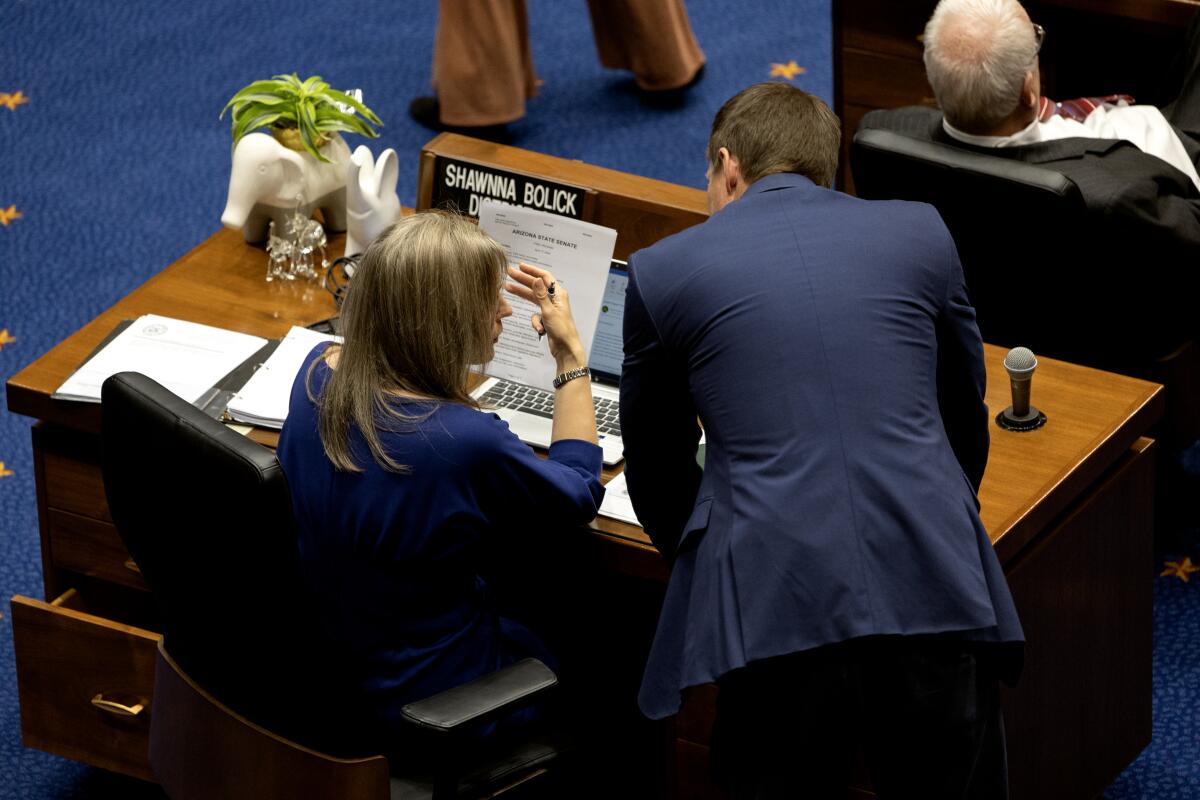
Sen. Shawnna Bolick confers with a colleague in the Senate chambers in April.
(Gina Ferazzi / Los Angeles Times)
For Sen. Bolick, who describes herself on the social media site X as a wife, mom and school-choice advocate, a career in education policy led her to work in government. Then-Gov. Doug Ducey, a fellow Republican, appointed her to the Arizona Early Childhood Education and Health Board in 2015; he appointed her husband to the state Supreme Court a year later.
She won a seat on the Arizona House of Representatives in 2018. Her profile rose in the wake of the 2020 election, when Arizona was roiled by election denialism, as she sponsored a bill that included a provision to give state legislators the ability to overrule the vote of the people. The bill died in committee.
The Washington Post reported that a couple of months earlier, Ginni Thomas, Supreme Court Justice Clarence Thomas’ wife, had emailed then-Rep. Bolick asking her to support a “clean slate of electors.”
Bolick responded with guidance for how to submit claims of voter fraud in Arizona, the Post reported, along with the message, “I hope you and Clarence are doing great!”
The Thomases are close with the Bolick family, according to the Post and the Arizona Mirror, which reported Justice Thomas is godparent to the Bolicks’ son.
When the Arizona Capitol Times in 2019 asked Shawnna Bolick how she and her husband juggled their unique situation, she responded: “We don’t talk much, let’s just say that. Our schedules don’t match up. I can’t even ask him for advice, which stinks because some issues might go to him.”
(For a time, according to the newspaper, the family was also represented in the Arizona executive branch, with their teenage son Ryne in the Governor’s Office of Youth, Faith and Family.)
Last summer, the Maricopa County Board of Supervisors unanimously appointed Shawnna Bolick to finish a term vacated by Sen. Steve Kaiser, a Republican who resigned amid frustrations with his party’s far-right flank.
Justice Bolick administered his wife’s swearing-in ceremony, she wiping away tears as he looked on with pride.
“Sweetheart, you never cease to amaze me, and I am enormously proud of you,” he said. Given their different roles, he observed, he couldn’t campaign for her or offer legislative advice.
“But there are three things I can do,” he said. “First of all, is to commend you for being one of the most amazing public servants I’ve ever known — and I mean that in the literal and best sense of the word. Second is I can swear you in.” He paused. “And the third is that after I swear you in, I can kiss you — and I don’t normally do that.”
After she swore her oath, he did.
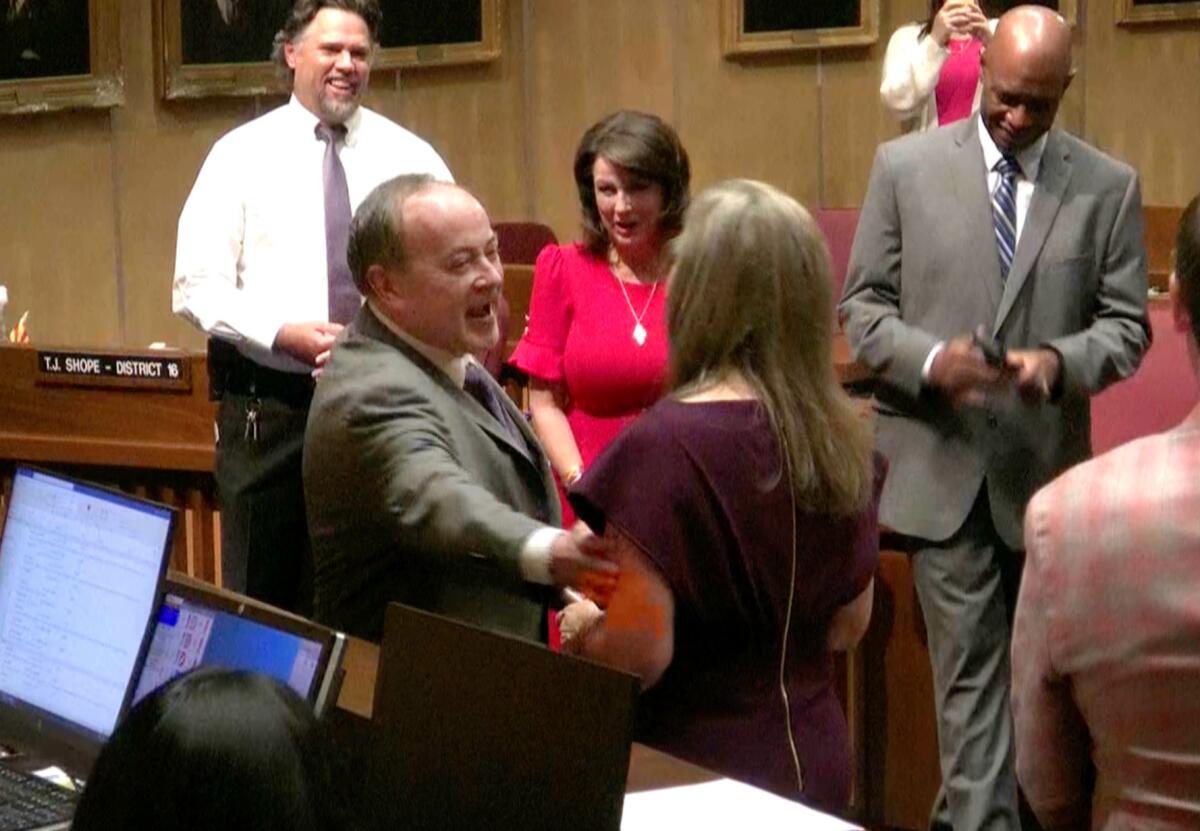
Justice Bolick congratulates his wife, Sen. Bolick, after her swearing-in last summer.
(Arizona Capitol Television)
In a Federalist Society keynote address two years ago at Arizona’s Waldorf Hotel, Justice Bolick described originalism and federalism — the division of power between national and local governments — as two of his “favorite ‘isms.’”
“We are oath-bound to give those words their original public meaning,” he said, adding, “We do not have one constitution, we have 51 constitutions. … We are empowered to give our constitutions a meaning that provides greater protection for individual liberty than is recognized at the federal level, but not less.”
After the U.S. Supreme Court overturned Roe vs. Wade, the Arizona Legislature passed a law — which Shawnna Bolick co-sponsored — that would restrict abortions after 15 weeks of pregnancy. But just five months after she was sworn into office as a senator, the Arizona Supreme Court took up the case examining whether the limited abortion ban superseded the 1864 law.
“Having a Supreme Court justice married to a key state legislator causes all sorts of problems,” said Paul Weich, a semiretired lawyer and Arizona politics watcher who runs two blogs covering the state court and Legislature.
When asked by a CBS station whether he should recuse himself from the case, Justice Bolick replied: “I will recuse in any challenge to the constitutionality of a law in which I am aware that my wife was a prime sponsor or prominently identified as a supporter or opponent. Otherwise, I will not.”
“This case involves statutory interpretation and does not challenge the constitutionality of the 15-week abortion limit, and thus presents no conflict of interest,” he wrote. “I therefore have an ethical duty to participate.”
The court issued its ruling on the 1864 ban in April. In his op-ed, Justice Bolick asserted that the court’s opinion was “solidly grounded in law.” He pointed to previous court decisions that he said angered activists from both parties.
“In our state, the people have the ultimate lawmaking power, including the ability to overturn our decisions,” he wrote. “But we cannot afford to have conscientious judges voted out for unpopular decisions.”
Already, activists have mounted an effort to unseat him in his upcoming retention election — an attempt the justice decried in his op-ed. Until recently, the justice said he was undecided whether he would seek retention. But he finally said he would, saying he intended to defend the judiciary’s independence.
“As a judge I have never ruled on the basis of politics — apparently, to my current detriment,” he wrote. “I would rather go down in electoral flames than to compromise my constitutional oath.”
Sen. Bolick reposted her husband’s article on X, writing, “Just like November 2018, I look forward to campaigning to retain my husband as the only appointed independent to our state’s highest court. Don’t let the Left hijack our independent judiciary we have in AZ.”
Still, Justice Bolick’s literalist reading of the law put his wife in a tricky predicament. Facing her first election as senator in north Phoenix, one of the most closely divided swing districts in the state, she must appeal both to her Republican base and Democrats who prefer a more moderate stance on abortion.
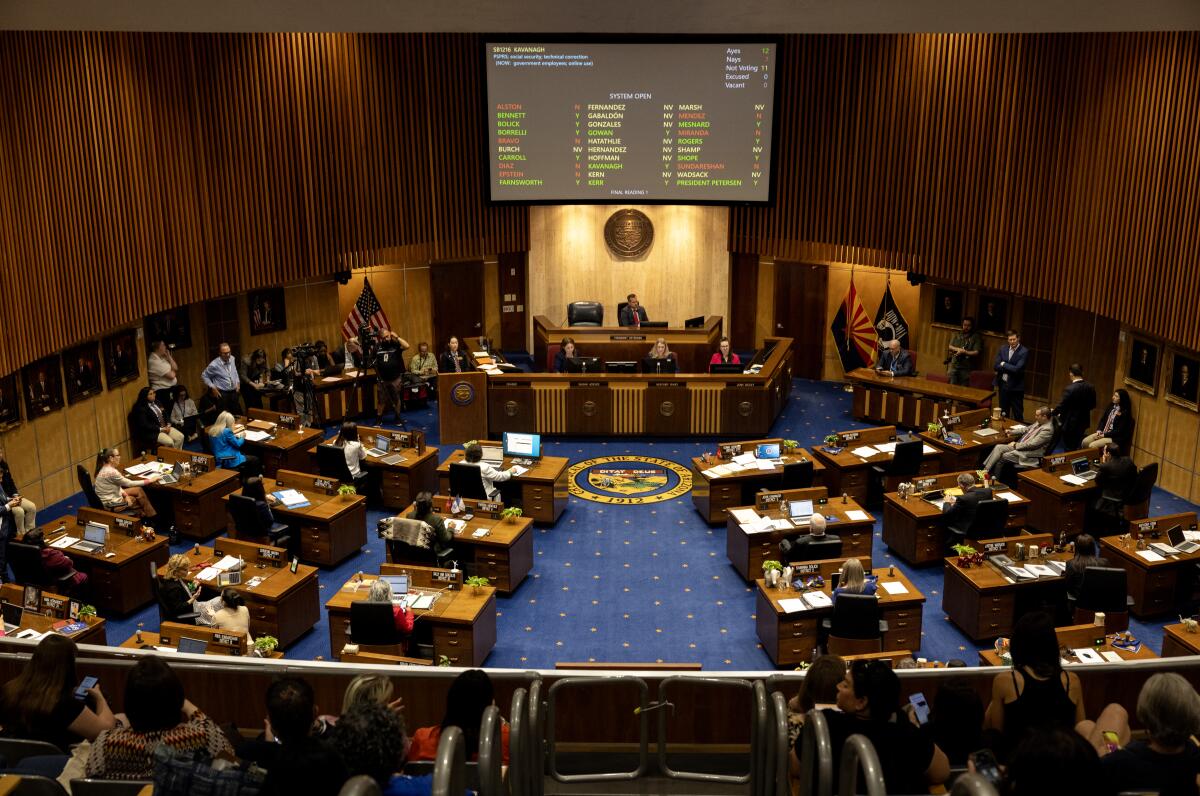
The Arizona Senate in session in April.
(Gina Ferazzi / Los Angeles Times)
Knowing that political reality, she stood before her colleagues May 1 in the Senate, where Republicans hold a two-seat majority, and launched into her story of three pregnancies.
“She is a notoriously private person,” said Coughlin. “I mean, I have not seen her ever, ever, ever, ever expose her personal feelings as she did in that 20-minute speech on the floor. All of us were looking at each other, going, ‘What is going on? What is this about?’”
Growing restless, her Republican colleagues called multiple times for a “point of order,” interrupting her speech to ask how it pertained to the matter at hand — the 1864 abortion law.
“The comments are germane because not every pregnancy is the same,” she replied.
She went on to criticize some Planned Parenthood practices before pivoting back to the proposed repeal of the law. When she said she’d vote for repeal, the chamber erupted with jeers. Gov. Katie Hobbs, a Democrat, signed the bill into law.
Bolick’s opponent in the Senate race, Democratic House Rep. Judy Schwiebert, said she was “moved” by Bolick’s remarks. Explaining her own passionate support for abortion access, Schwiebert cited her son and daughter-in-law; they tried to have a child through in vitro fertilization, only for the pregnancy to become nonviable and require an abortion.
But Schwiebert said she was disappointed that Bolick targeted abortion providers in her speech.
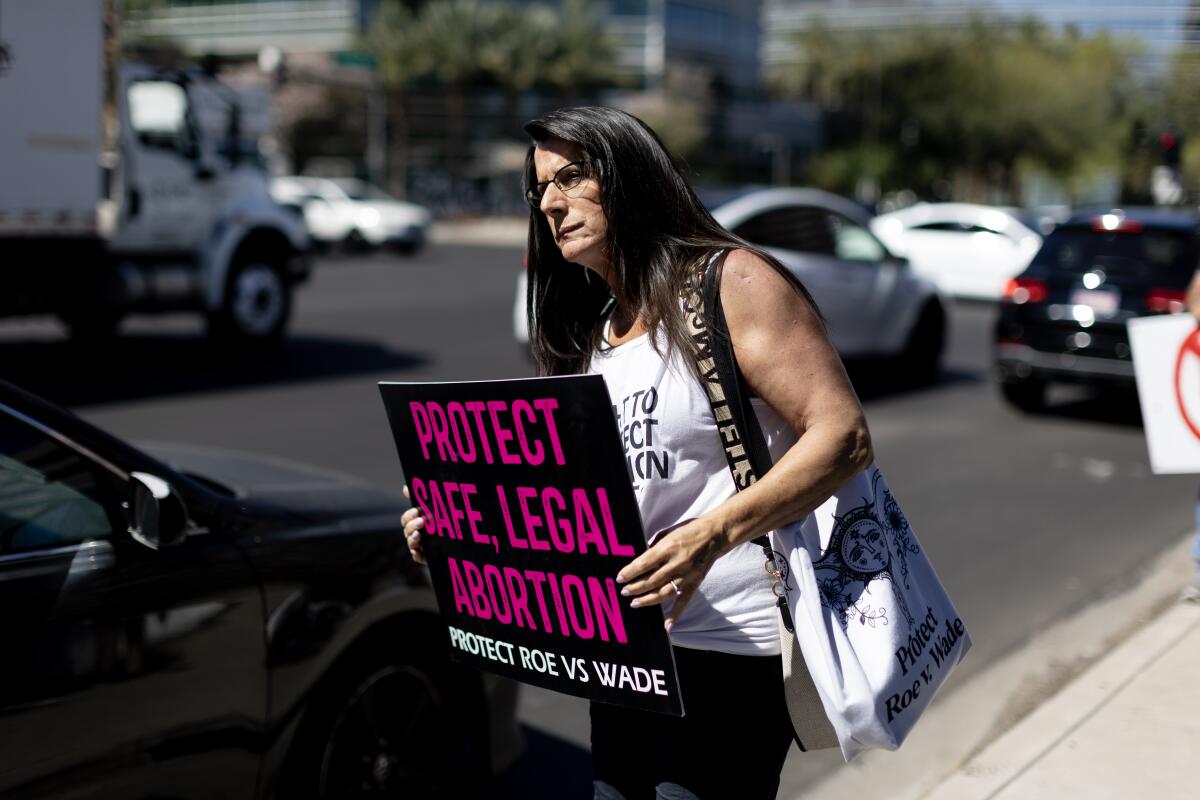
Nancy Gillenwater of Scottsdale rallies with others against the Arizona abortion ban in April.
(Gina Ferazzi / Los Angeles Times)
“I suppose that she was trying to thread a needle of explaining her vote to get sympathy or support from Democratic voters, but at the same time, trying to bash Planned Parenthood types of organizations, because that plays well with her base,” Schwiebert said. “So it was a little bit of a convoluted speech, unfortunately, because of that for me.”
Coughlin, of the political consulting firm in Phoenix, believed Sen. Bolick’s speech was genuine but predicted it would not help her in November.
“My money’s on Schwiebert winning that race,” he said.
He also predicted that a proposed ballot measure, which would enshrine abortion protections in the state constitution, would pass in Bolick’s district.

Politics
Paxton vows he’s ‘staying in this race’ even if Trump backs Cornyn in Texas GOP clash

NEWYou can now listen to Fox News articles!
Texas Attorney General Ken Paxton is making it clear: he’s staying in the race for the Republican Senate nomination even if President Donald Trump endorses Paxton’s rival, longtime Sen. John Cornyn.
“I’m staying in this race,” Paxton said in an interview Wednesday evening. “I owe it to the people of Texas.”
Trump says he’ll soon take sides in the costly and combustible GOP primary showdown Cornyn and Paxton.
“I will be making my Endorsement soon,” the president wrote in a social media post hours after Cornyn and Paxton advanced to a May 26 runoff election.
The two heated rivals topped a crowded field of contenders in Tuesday’s primary, but since no one cleared the 50% threshold, the nomination race heads into overtime.
Texas Governor Greg Abbott, second from left, President Donald Trump, center, Sen. Ted Cruz (R-Texas), second from right, and Secretary of Energy Chris Wright, right, take part in a briefing on energy at the Port of Corpus Christi in Corpus Christi, Texas, Feb, 27, 2026. (Mandel NGAN/AFP via Getty Images)
Trump added that he “will be asking the candidate that I don’t Endorse to immediately DROP OUT OF THE RACE!”
A Republican operative in Trump’s political orbit told Fox News Digital it’s expected Cornyn will get the president’s endorsement. However, the president has been known to change his mind on candidates or even reverse endorsements.
A second source in Trump’s political orbit told Fox News that while there’s still jockeying to influence the president’s decision, given Cornyn’s better-than-expected performance in the primary, Trump is expected to back the senator and prevent a messy and expensive runoff.
CONTENTIOUS REPUBLICAN SENATE PRIMARY IN TEXAS HEADED INTO OVERTIME
Asked if he would end his Senate bid if Trump backed Cornyn, Paxton, a MAGA firebrand and longtime Trump supporter and ally, said no in an interview with Real America’s Voice.
“I’ve spent a year of my life campaigning against John Cornyn because John has not represented the people of Texas well,” Paxton argued. “He’s been against Trump in both of his elections, said he shouldn’t run last time. … The people of Texas, at least the Republicans, would like something different.”
Texas Attorney General Ken Paxton, a Republican candidate for the U.S. Senate, speaks during a primary election night watch party March 3, 2026, in Dallas. (Julio Cortez/The Associated Press )
And a source in Paxton’s political orbit emphasized to Fox News Digital that the Texas attorney general isn’t getting out of the race.
Cornyn or Paxton will face off in the general election against rising Democratic Party star state Rep. James Talarico, who topped progressive firebrand Rep. Jasmine Crockett, a vocal Trump critic, in the Democrats’ primary. Talarico is trying to become the first Democrat in nearly four decades to win a Senate election in right-leaning Texas.
‘OPEN BORDERS, TRUMP-HATING RADICAL’—REPUBLICANS QUICKLY POUNCE ON TALARICO
The 2026 Senate showdown in Texas is one of a handful across the country that could determine if Republicans hold their majority in the chamber in the midterm elections. The GOP currently controls the chamber 53–47.
The Cornyn campaign and aligned super PACs spent nearly $100 million to run ads attacking Paxton and Republican Rep. Wesley Hunt — who came in third — with the senator charging in the closing weeks of the primary campaign that Democrats would flip the seat in the general election if Paxton was the GOP’s nominee.
Cornyn, his allies and the National Republican Senatorial Committee (NRSC), the campaign arm of the Senate GOP, repeatedly pointed to the slew of scandals and legal problems that have battered Paxton over the past decade, as well as his ongoing messy divorce.
“Over the next 12 weeks, Texas Republican primary voters will hear more about my record of delivering conservative victories in the United States Senate, and learn more about Ken’s indefensible personal behavior and failures in office,” Cornyn told reporters on Tuesday night.
“Just like the primary, we have a plan to win the runoff, and we are in the process of executing it,” Cornyn said. “Judgment day is coming for Ken Paxton.”
Sen. John Cornyn, R-Texas, speaks during a campaign stop in The Woodlands, Texas, Feb. 28, 2026. (Annie Mulligan/AP Photo)
Paxton, a MAGA firebrand and longtime Trump supporter and ally who grabbed significant national attention by filing lawsuits against the Obama and Biden administrations, told supporters on primary night, “As we head into this runoff, we’re going to make the choice even clearer. While John Cornyn was cutting deals on gun control and amnesty, I was suing corrupt Joe Biden over 107 times.”
And he charged, “John Cornyn spent around $100 million trying to buy this seat. We’ve spent around $5 million.”
ROUND TWO OF CORNYN VS. PAXTON GETS UNDER WAY
Trump on Wednesday urged, “for the good of the Party, and our Country, itself, be allowed to go on any longer. IT MUST STOP NOW!”
And pointing to Talarico, the president argued, “We have an easy to beat, Radical Left Opponent, and we have to TOTALLY FOCUS on putting him away, quickly and decisively.”
State Rep. James Talarico, a Democratic candidate for the U.S. Senate, speaks at a primary election watch party Tuesday, March 3, 2026, in Austin, Texas. (Eric Gay/AP Photo)
“Both John and Ken ran great races, but not good enough. Now, this one, must be PERFECT!” Trump warned.
Trump, whose clout over the GOP remains immense, stayed neutral in the Republican primary race. All three candidates, who sought the president’s endorsement, were in attendance Friday as Trump held an event in Corpus Christi, Texas.
“They’re in a little race together,” Trump said of Cornyn and Paxton. “You know that, right? A little bit of a race. It’s going to be an interesting one, right? They’re both great people, too.”
Meanwhile, on Capitol Hill, the lobbying campaign to clinch the endorsement for Cornyn hasn’t stopped, and if anything, is intensifying in the hours since primary night.
Senate Majority Leader John Thune, R-S.D., told reporters that Cornyn had “a great night” against Paxton. The top Senate Republican has spent the last several months bending Trump’s ear at every opportunity to jump into the race and back the longtime incumbent.
“He’s positioned to win the runoff, and if the president endorses early, it saves everybody a lot of money, and a lot of, you know, just 10 weeks of another spirited campaign on our side that keeps us from spending time focusing on the Democrats,” Thune said.
Thune spoke with Cornyn on Wednesday morning, and believed that Talarico was the more formidable match-up for Republicans in November — one that Cornyn was better suited to win.
“The matchup that’s good for us is John Cornyn at the top of the ticket,” Thune said.
NRSC communications director Joanna Rodriguez told Fox News Digital, “John Cornyn remains the only candidate who guarantees state Rep. Talarico never becomes a United States senator and ensures the fight for President Trump’s Senate majority is waged in true battleground states, not Texas.”
And the Thune-aligned Senate Leadership Fund (SLF), the top super PAC backing Senate Republicans, which spent millions on behalf of Cornyn in the primary campaign, made it clear in a statement early Wednesday that it will continue to support the senator in the runoff.
“SLF and its sister organizations were proud to support Senator Cornyn early, and we look forward to him securing the Republican nomination on May 26,” the group’s executive director, Alex Latcham, said in a statement.
Meanwhile, a GOP political operative in Trump’s orbit told Fox News Digital, “Talarico being the nominee makes President Trump’s endorsement of Cornyn more important than ever.”
While Trump stayed neutral, his top pollster, Tony Fabrizio, helped the Cornyn campaign. And veteran Republican strategist Chris LaCivita, who served as co-campaign manager of Trump’s 2024 White House bid, consulted for a top Cornyn-aligned super PAC.
LaCivita, in a social media post Tuesday night aimed at Paxton and his top political consultant, wrote, “The second wave is going to be a (bi–h.)”
But on the Paxton side of the playing field, operatives and donors are confident they can unseat the senator.
Dan Eberhart, an oil drilling chief executive officer and prominent Republican donor and bundler who supports Paxton, told Fox News Digital, “This was Cornyn’s shot to fend off his challenger by getting over 50%, and he couldn’t do it. The runoff voters will be even less friendly territory for Cornyn.”
Pointing to former longtime Senate GOP leader Sen. Mitch McConnell, R-Ky., who has often acted as a Trump foil, Eberhart said, “This race is about MAGA vs. McConnell.”
Texas Attorney General Ken Paxton speaks to supporters at a campaign event on primary eve, in Waco, Texas on March 2, 2026. (Paul Steinhauser/Fox News)
Meanwhile, Lone Star Liberty, a pro-Paxton super PAC, circulated a memo ahead of Tuesday’s election that shrugged off threats that Cornyn would succeed in the runoff by continuing to hammer the attorney general over his litany of scandals, arguing there was nothing new to offer.
CLICK HERE TO DOWNLOAD THE FOX NEWS APP
“Cornyn’s talk of ‘unleashing’ new attacks in the runoff is bluster,” the memo states. “The truth is that from day one, his forces fired every bullet they had. There are no new attacks left — only more of the same, at ever-greater cost and with ever-diminishing returns.”
Fox News’ Rich Edson contributed to this report
Politics
Fears mount at CBS News and CNN over merger, consolidation
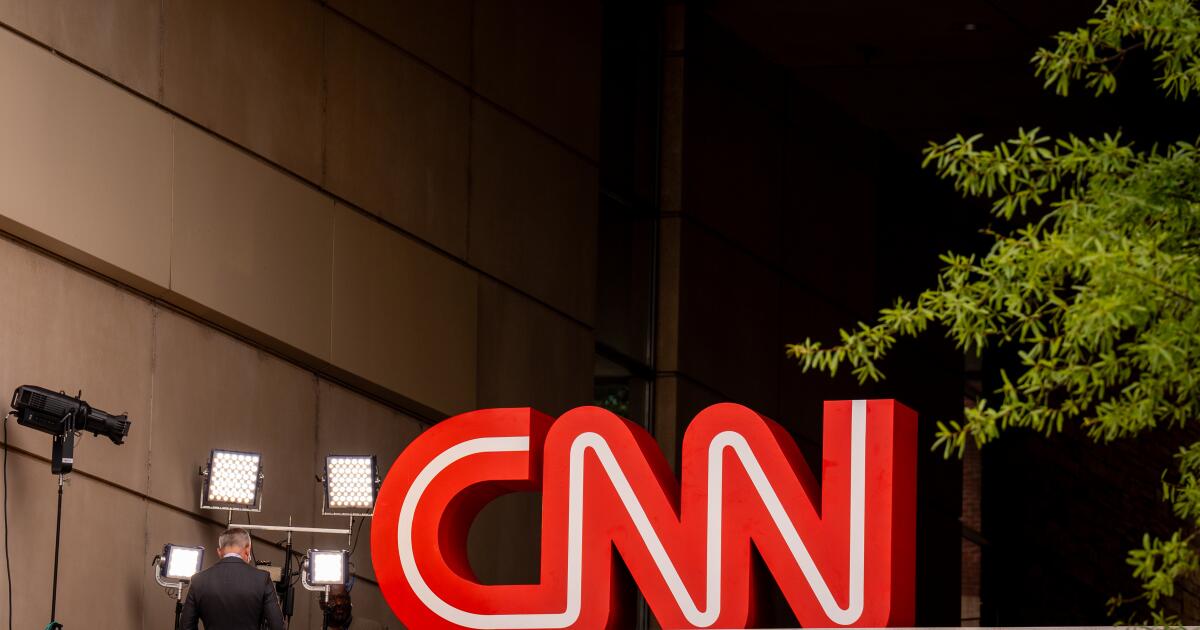
Paramount’s $111-billion deal to acquire Warner Bros. Discovery will put two of the most storied journalism brands — CNN and CBS News — under one roof.
The combination has been proposed before with the aim of consolidating news-gathering costs. Those plans fell apart largely over who would be in control.
But if the Paramount-WBD transaction is approved by regulators, CNN and CBS News will be forced into potentially rocky marriage where they will have to sort out leadership roles, personnel and editorial direction.
It’s still too early to determine what those moves will be and how widely they will be felt.
Last week CNN Chief Executive Mark Thompson told his troops to avoid “jumping to conclusions about the future.”
But what is certain is that every permutation will be scrutinized closely due to the fraught relationships both CNN and CBS News have with the Trump administration.
“There have been many conversations over the years about combining CBS News and CNN,” said Jon Klein, a digital media entrepreneur who previously held leadership roles at both organizations. “But this time, it’s different. The business case always made sense — but today you’ve got the overlay of the political agenda.”
Before Paramount prevailed in its bid for CNN’s parent, Paramount Chief Executive David Ellison’s father Larry Ellison reportedly discussed changes to the network with Trump. For years, Trump has made CNN the poster child of his “fake news” claims and impugned many of its journalists.
“What has David Ellison and Larry Ellison promised Donald Trump with regard to what they’re going to do with CNN?” said one former executive. “Before you even get through the hurdles of doing this, that’s the overriding question. Are they going to fire anchors Trump doesn’t like?”
There is also apprehension at CBS News, where David Ellison installed Bari Weiss as editor-in-chief in October, with a mandate to have network’s coverage appeal to the political center.
CBS News editor-in-chief Bari Weiss with Turning Point USA’s Erika Kirk at a town hall that aired Dec. 20.
(CBS Photo Archive / CBS via Getty Images)
Weiss — founder of the independent media company The Free Press — came into the role with no experience running a TV news organization, building her reputation as an opinion writer with contrarian views and a disdain for woke ideology.
The former New York Times opinion writer, who is staunchly pro-Israel, drew criticism over the weekend for putting a fire emoji over a comment criticizing New York City Mayor Zohran Mamdani’s condemnation of the U.S. military action in Iran — an unusual public reaction for the head of a major news organization.
Weiss wasted no time taking on the prestigious CBS news magazine “60 Minutes,” which has long been a stubbornly independent operation. She delayed a story on the harsh El Salvador prison used by the U.S. to house undocumented migrants saying it needed more reporting. The story’s correspondent Sharyn Alfonsi accused CBS News management of placating the White House, turning the decision into a public relations fiasco for the network.
Significant changes are coming to “60 Minutes” later this spring, with one or more of its correspondents possibly being replaced, according to people familiar with Weiss’ plans who were not authorized to comment. Weiss has also expressed interest in hiring right-leaning on-air talent for CBS News.
Some CBS News leadership is already heading for the exit. Shana Thomas, longtime “CBS Mornings” executive producer, told staff Thursday she is leaving at the end of the month. “I’ve been thinking about this for a while and frankly, I’m tired y’all,” she wrote in a memo.
Weiss arrived after Paramount settled a Trump lawsuit with the dubious claim that a “60 Minutes” interview with then-Vice President Kamala Harris was deceptively edited to aid her 2024 presidential election campaign against him.
The willingness to settle the suit was largely seen as Paramount capitulating to Trump in order to get government approval of its merger with Skydance Media. The Ellisons’ tight relationship with Trump was also seen as an asset in their successful pursuit of Warner Bros. Discovery.
The stew of issues bubbling through the transactions is why most of the rank and file at CNN rooted for Netflix to prevail in its bidding for Warner Bros. Discovery. The Netflix bid for WBD did not include CNN or the company’s cable networks, which in the words of one insider would have made it “a stay of execution.”
Now CNN staffers, speaking on the condition of anonymity, are bracing for upheaval. When they look at CBS News navigating the changes under Weiss, they are reminded what they went through after Warner Bros. Discovery took over their network and tried to push the coverage to the center.
After a declaration by WBD Chief Executive David Zaslav that the network needed to be more accommodating to conservative voices — and the telecast of a rowdy Trump town hall — CNN experienced an exodus of viewers.
But the biggest fear that the merger brings is consolidation and the loss of jobs. CNN has 3,400 employees while CBS News is at around 1,000. Cost-cutting is expected to be aggressive across the combined Paramount-WBD, which will have a mountain of debt to service.
The parent companies of CBS and CNN have discussed merging or sharing news-gathering operations and on-air talent numerous times over several decades. In 2019, Viacom, the CBS News parent at the time, had a deal in place to pay CNN an annual license fee to provide international coverage.
Under that plan, CBS would have maintained a few of its signature overseas correspondents, while shuttering its bureaus around the world. But Viacom backed out of the deal.
CNN’s international coverage has long been its calling card and its likely the network will handle that reporting for CBS News once Paramount takes ownership.
Combining the news-gathering operation stateside will be trickier, as CBS News has employees and vendors that operate under contracts with the Writers Guild of America East, SAG-AFTRA and other unions. CNN is a non-union shop.
Resolving the union issue has been a snag in every previous discussion to combine CBS News and CNN over the years, according to several former executives at both outlets.
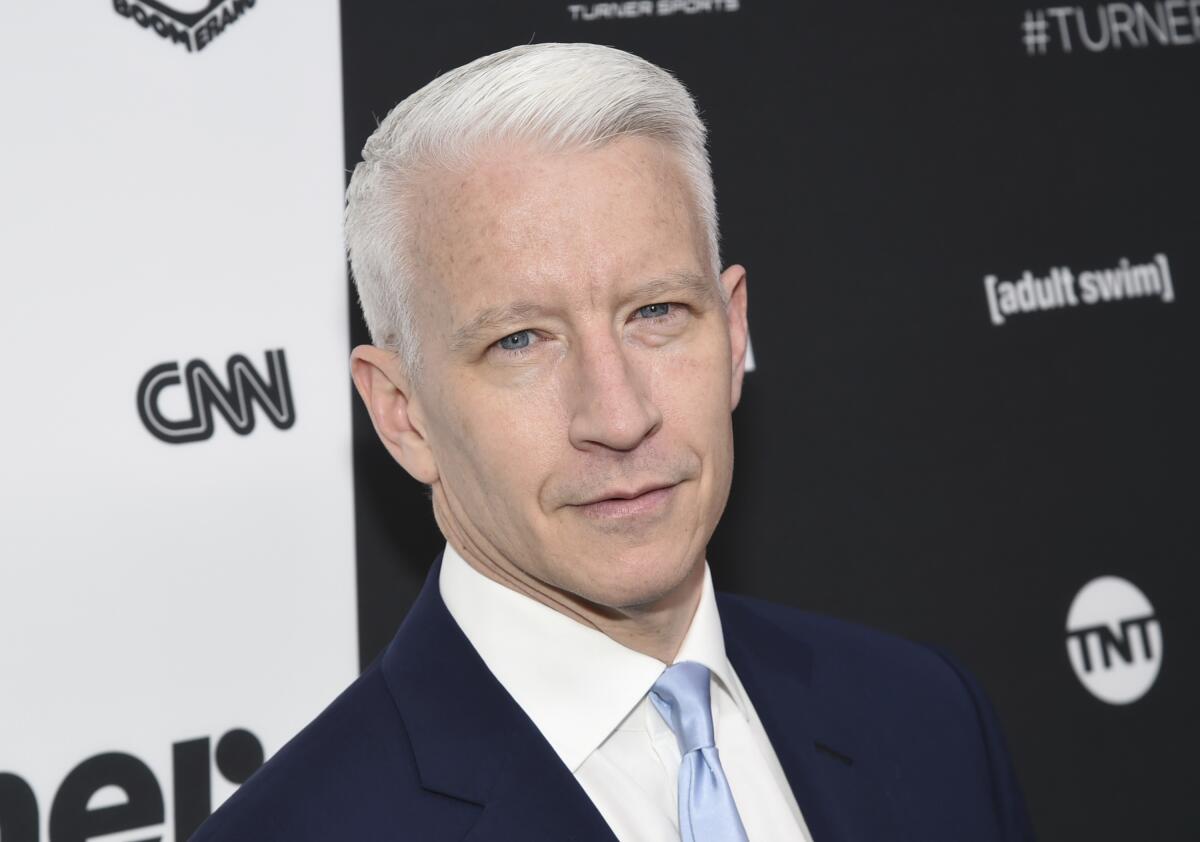
CNN news anchor Anderson Cooper in New York in 2016.
(Associated Press)
Another development worth watching is what role Anderson Cooper will play in the merged operation. Cooper signed a new deal with CNN last year, but turned down an offer to remain as a “60 Minutes” correspondent, a role he’s had since 2007.
CBS News has pursued Cooper several times over the years to be its evening news anchor. There was even a proposal in 2018 for him to helm “CBS Evening News” while keeping his nightly prime time program on CNN. That idea was shot down at CNN, where leadership believed he was unique to the network’s brand.
In a statement, Cooper cited a desire to spend more time with his two children as the reason for passing on another “60 Minutes” deal. However, associates have said his wariness over the direction of CBS News under Weiss made his decision easier.
Now Cooper is likely headed into the CNN-CBS News tent, which may make him feel a bit like Michael Corleone in “Godfather III” when he said “Just when I thought I was out, they pull me back in!”
Politics
Video: Senate Republicans Block Limits to Trump’s War Powers

new video loaded: Senate Republicans Block Limits to Trump’s War Powers
transcript
transcript
Senate Republicans Block Limits to Trump’s War Powers
Senate Republicans voted against a Democratic bill that would have required President Trump to obtain congressional authorization to continue waging war against Iran.
-
“The yeas are 47. The nays are 53. The motion to discharge is not approved.” “President Trump decided to attack Iran. That decision was profound, deliberate and correct. The president understands the weight of war.” “Why is Donald Trump hellbent on making history repeat itself? Why is he plunging America headfirst into a war that Americans do not want, and which he cannot even explain? The American people deserve a say, and that is what our resolution is about.”
By Shawn Paik
March 5, 2026
-

 World1 week ago
World1 week agoExclusive: DeepSeek withholds latest AI model from US chipmakers including Nvidia, sources say
-

 Wisconsin4 days ago
Wisconsin4 days agoSetting sail on iceboats across a frozen lake in Wisconsin
-

 Massachusetts1 week ago
Massachusetts1 week agoMother and daughter injured in Taunton house explosion
-

 Maryland5 days ago
Maryland5 days agoAM showers Sunday in Maryland
-

 Massachusetts3 days ago
Massachusetts3 days agoMassachusetts man awaits word from family in Iran after attacks
-

 Florida5 days ago
Florida5 days agoFlorida man rescued after being stuck in shoulder-deep mud for days
-

 Denver, CO1 week ago
Denver, CO1 week ago10 acres charred, 5 injured in Thornton grass fire, evacuation orders lifted
-

 Oregon6 days ago
Oregon6 days ago2026 OSAA Oregon Wrestling State Championship Results And Brackets – FloWrestling



















